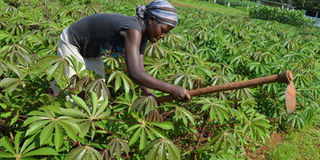Sow better value chains to reap food security

Many Kenyans are getting into agribusiness and trying to make commercial sense out of farming. FILE PHOTO | NMG
What you need to know:
- Research Organisation were specifically set up to support better agricultural practices.
- It is obvious that peasant farming cannot sustain food supply at the household level and that urbanisation continues to increase demand for agricultural produce.
- In Kenya, use of advanced technology in farming and in value-addition lags.
Commercial agriculture, commonly referred to as agribusiness has been around for many years.
Worldwide, this sector is at the heart of many livelihoods. In Kenya, universities such as Egerton and Jomo Kenyatta University of Agriculture and Technology (JKUAT) and many other institutions such as Kenya Agricultural and Livestock Research Organisation were specifically set up to support better agricultural practices.
In spite of the extensive knowledge that these institutions generate, we remain a food insecure country. It is obvious that peasant farming cannot sustain food supply at the household level and that urbanisation continues to increase demand for agricultural produce.
In the last few months, a major shortage of products such as potatoes and milk has hit most parts of the country. Today more than ever before, commercialisation of agriculture is a subject that is receiving renewed interest in Kenya.
Looking back, I visited Prof Esther Kahangi at JKUAT in Ruiru about two decades ago. I wrote an in-depth article about her tissue culture bananas initiative. I have no doubt that commercialisation of banana farming in the country has increased because of Prof Kahangi’s research-based intervention.
Unfortunately, the same cannot be said of all other agricultural products or their value addition or even in mechanisation of agriculture. Passing through the Mwea Irrigation Scheme a few days ago, it was evident that some ancient farming practices are followed to date. Declining productivity, post-harvest losses, glut and poor market linkages are some of the hurdles that those in agribusiness continue to grapple with.
Despite these hurdles, many Kenyans are getting into agribusiness and trying to make commercial sense out of farming. Though we remain a food insecure nation, we have made a few milestones in the sector as we slowly, but steadily play catch up.
In particular, we have witnessed changes in our primary food production activities such as the proliferation of greenhouse farming as well as irrigation projects. In addition, we have seen value addition of farm produce such as packaging and freezing as well as better market linkages on both the supply and the demand side of agricultural production.
Futuristic universities such as Strathmore are now offering agribusiness management programmes. Consumers too are becoming keener on the health, safety and nutrition aspects of the foods they consume.
Furthermore, young professionals commonly referred to as agripreneurs are going into commercial agriculture and are trying to keep up with its changing trends. The need for the consistent supply of affordable food has been the driving force for the commercialisation of agriculture.
In some parts of the world, agribusiness is lucrative. Last year I visited a Soybeans farmer in America and it was amazing that one grower is able to farm hundreds of acres single-handedly.
In Kenya, use of advanced technology in farming and in value-addition lags. Unless agricultural value chains are strengthened, we will continue to experience low productivity, face food shortage and spend money on imported food that we can grow and process locally.
Though the face of agribusiness in Kenya is changing, the pace at which it is moving leaves a lot to be desired. Agribusiness must become an area of special attention if we are to become a food secure nation.




